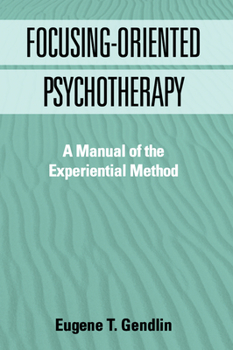Focusing-Oriented Psychotherapy: A Manual of the Experiential Method
Select Format
Select Condition 
Book Overview
Examining the actual moment-to-moment process of therapy, this volume provides specific ways for therapists to engender effective movement, particularly in those difficult times when nothing seems to be happening. The book concentrates on the ongoing client therapist relationship and ways in which the therapist's responses can stimulate and enable a client's capacity for direct experiencing and "focusing." Throughout, the client therapist relationship...
Format:Paperback
Language:English
ISBN:157230376X
ISBN13:9781572303768
Release Date:August 1998
Publisher:Guilford Publications
Length:317 Pages
Weight:0.55 lbs.
Dimensions:0.9" x 6.0" x 9.0"
Customer Reviews
2 ratings
Making Any Therapy More Effective....
Published by Thriftbooks.com User , 14 years ago
Over 50 years ago, a research study, done in Carl Rogers's Counseling Center at The University of Chicago, showed that successful & unsuccessful psychotherapy clients could be picked out in the first session or two. It wasn't what the therapist did or the therapist's theoretical orientation/training. It was what clients already knew how to do. Or didn't know how to do, and then they failed. Because psychotherapy, as then practiced, didn't teach clients this skill. After a decade of more research, Gendlin found that this skill, now called Focusing, could be taught. Currently, more than 80 research studies have validated this finding. (See Dr. Mary Hendricks's summary of this research, available free at www.focusing.org.) In "Focusing-Oriented Psychotherapy", Gendlin shows -- carefully, precisely & with many specific examples from psychotherapy -- how Focusing, with its "Eight Characteristics of an Experiential [Change] Step", can be seen & encouraged when clients already know how to Focus. He also shows -- again carefully, precisely & with many specific examples from therapy -- how these steps, how Focusing can be fostered when clients don't come into therapy already knowing how to Focus. And more: Gendlin shows how these "Eight Characteristics" can be fostered within 11 different therapeutic techniques & approaches, making those techniques & approaches more effective. Here, he's also modeling how Focusing and the felt-sense can be combined with any technique, any approach to increase its effectiveness. Which is why it's not called "Focusing Therapy", but rather "Focusing-Oriented Therapy". This book comes out of decades of Gendlin's work as a practicing psychotherapist and as a teacher of psychotherapists. Gendlin was also the founding editor of the American Psychological Association's psychotherapy journal. He was the recipient of the APA's first "Distinguished Psychotherapist Award", as well as anther "Distinguished Therapist Award" within the past decade. He's perhaps best known as the writer/developer of Focusing (See my review.) as well as a world-reknowned philosopher. (See his Experiencing and the Creation of Meaning: A Philosophical and Psychological Approach to the Subjective (SPEP) and Language Beyond Postmodernism: Saying and Thinking in Gendlin Philosophy (SPEP).) Disclosure: I've been a Focusing-Oriented Therapist for 20 years. I learned Focusing from Gendlin's book, and with my wife, for many years we were trainers in his Focusing workshops. I write & present on many Focusing topics, including Focusing-Oriented Psychotherapy. "Focusing-Oriented Psychotherapy" starts discussing two types of "dead-end" therapies, therapies where nothing changes: "Dead-End Discussion" & "Dead-End Feelings". From this, Gendlin draws two conclusions. First, "Moment by moment, after anything either person says or does, one must attend to the effect it has on what is directly experienced". "Directly Experienced" m
Avenues of Approach
Published by Thriftbooks.com User , 20 years ago
Dr. Eugene Gendlin has created a book that describes his phenomenologically grounded practice of focusing. Gendlin wrote this book for therapists, but non-therapists (I am one) can profitably read it, too.In the first part of the book, he gives a detailed description of focusing, along with generously annotated transcripts of focusing-oriented therapy sessions. The second part is an attempt to explicate the field of psychotherapy, by taking the various orientations, extracting the techniques they employ, and reconceptualizing them as "avenues" or approaches to therapy. These avenues include bodily energy, role-play, dreams, images, reliving and catharsis, cognition, action steps, processing the superego, and values. Once the therapist (or the client) has learned to work on these avenues, as such, he is able to move freely among them, using the 'felt sense' of focusing as a touchstone.As a client of an immensely talented focusing therapist years ago, I can say that this process saved my psychic life with its skill and compassion. It has been a long time since there has been a system of psychotherapy that has its ground in a metapsychology/philosophy that stands up to inspection.I recommend this book as an adjunct to self-therapy. It is a great way to take disparate techniques that you may have learned here and there and increase their potency by "experientializing" them and learning to use them with one another.




